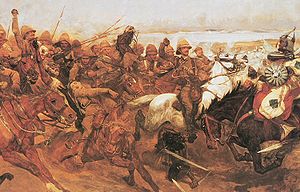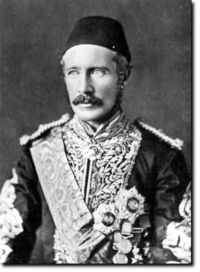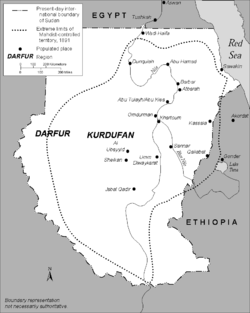- Mahdist War
-
Mahdist War 
Depiction of the Battle of Omdurman (1898).Date 1881–1899 Location Sudan, Egypt, Uganda, Ethiopia Result British-Egyptian victory Territorial
changesSudan becomes an Anglo-Egyptian condominium Belligerents  United Kingdom
United Kingdom
 Italy[2]
Italy[2]
 Belgium[3]
Belgium[3]
 Ethiopian Empire (1885-1889)[4]
Ethiopian Empire (1885-1889)[4]Mahdist Sudan Commanders and leaders  Charles George Gordon †
Charles George Gordon †
 Herbert Kitchener
Herbert Kitchener
 Oreste Baratieri
Oreste Baratieri
 Giuseppe Arimondi
Giuseppe Arimondi
 Yohannes IV †
Yohannes IV †Muhammad Ahmad
Abdallahi ibn Muhammad (KIA)
Several other advisors, Emirs, and officersCasualties and losses ~17,821 to all causes ~73,148+ to all causes Tunisian Campaign – Mahdist War – First Mandingo War – Battle of Dogali – First Franco-Dahomean War – Pioneer Column Expedition – Second Franco-Dahomean War – First Matabele War – Second Mandingo War – Fourth Anglo-Ashanti War – First Italo-Ethiopian War – Second Matabele War – Anglo-Zanzibar War - Benin Expedition – Third Mandingo War – Central Africa Mission – Fashoda Incident – Second Boer War – Herero and Namaqua Genocide – First Moroccan Crisis – Bambatha Rebellion – Wadai War – Second Moroccan Crisis – Second Franco-Moroccan War – Italo-Turkish War – Maritz RebellionThe Mahdist War (also called the Mahdist Revolt) was a colonial war of the late 19th century. It was fought between the Mahdist Sudanese and the Egyptian and later British forces. It has also been called the Anglo-Sudan War or the Sudanese Mahdist Revolt. The British have called their part in the conflict the Sudan Campaign. It was vividly described by Winston Churchill (who took part in its concluding stages) in The River War.
Contents
Background
Following the invasion by Muhammed Ali in 1819, Sudan was governed by an Egyptian administration. This colonial system was resented by the Sudanese people, because of the heavy taxes it imposed and because of the bloody start of the Turkish-Egyptian rule in Sudan.
Throughout the period of Turco-Egyptian rule, many segments of the Sudanese population suffered extreme hardship due to the system of taxation imposed by the central government. Under this system, a flat tax was imposed on farmers and small traders and collected by government-appointed tax collectors from the Sha'iqiyya tribe of northern Sudan. In bad years, and especially during times of drought and famine, farmers were unable to pay the high taxes. Fearing the brutal and unjust methods of the Sha'iqiyya, many farmers fled their villages in the fertile Nile Valley to the remote areas of Kordofan and Darfur. These migrants, known as black "Jallaba" after their loose-fitting style of dress, began to function as small traders and middlemen for the foreign trading companies that had established themselves in the cities and towns of central Sudan.
By the middle 19th century the Ottoman Imperial subject administration in Egypt was in the hands of Khedive Ismail. Although not a competent or devoted leader, Khedive Ismail had grandiose schemes about Egypt. His spending had put Egypt into huge debt and when his financing of the Suez Canal started to crumble, Great Britain stepped in and repaid his loans in return for controlling shares in the canal. As the most direct route to the jewel in the British Crown, India, control over the Suez Canal was of paramount strategic importance, so that British interests dictated the need to seize or otherwise control it. Thus an ever increasing role in Egyptian affairs was mandated for the British Empire. With Khedive Ismail's spending and corruption causing instability, in 1873 the British government supported a program where an Anglo-French debt commission assumed responsibility for managing Egypt's fiscal affairs. This commission eventually forced Khedive Ismail to abdicate in favor of his son Tawfiq in 1877, leading to a period of political turmoil.
Ismail had appointed General Charles "Chinese" Gordon Governor of the Equatorial Provinces of Sudan in 1873. For the next three years, General Gordon fought against a native chieftain of Darfur, Zobeir,
Upon Ismail's abdication Gordon found himself with dramatically decreased support. He eventually resigned his post in 1880, exhausted by years of work, and left early the next year. His policies were soon abandoned by the new governors, but the anger and discontent of the dominant Arab minority was left unaddressed.[citation needed]
Although the Egyptians were fearful of the deteriorating conditions, the British refused to get involved, "Her Majesty’s Government are in no way responsible for operations in the Sudan", the Foreign Secretary Earl Granville noted.
Among the forces historians see as the causes of the uprising are ethnic Sudanese anger at the foreign Turkish Ottoman rulers, Muslim revivalist anger at the Turks' lax religious standards and willingness to appoint non-Muslims such as the Christian Charles Gordon to high positions and Sudanese Sufi resistance to "dry, scholastic Islam of Egyptian officialdom".[5]
Mahdi Revolt
 Muhammad Ahmad, the self-proclaimed Mahdi.
Muhammad Ahmad, the self-proclaimed Mahdi.
In the 1870s, a Muslim cleric named Muhammad Ahmad preached renewal of the faith and liberation of the land, and began attracting followers. Soon in open revolt against the Egyptians, Muhammad Ahmad proclaimed himself the Mahdi, the promised redeemer of the Islamic world. The then-governor of the Sudan, Raouf Pasha, sent two companies of infantry with one machine gun to arrest him. The captains of the two companies were each promised promotion if their soldiers were the ones to return the Mahdi to the governor. Both companies disembarked from the steamer that had brought them up the Nile to Abba and approached the Mahdi's village from separate directions. Arriving simultaneously, each force began to fire blindly on the other, allowing the Mahdi's scant followers to attack and destroy each force in turn.[6]
The Mahdi then began a strategic retreat to Kordofan, where he was at a greater distance from the seat of government in Khartoum. This movement, couched as a triumphal progress, incited many of the Arab tribes to rise in support of the Jihad the Mahdi had declared against the "Turkish oppressors". Another Egyptian expedition dispatched from Fashoda was ambushed and slaughtered on the night of December 9.[7]
The Egyptian administration in the Sudan, now thoroughly concerned by the scale of the uprising, assembled a force of four thousand troops under Yusef Pasha. This force approached the Mahdist gathering, whose members were poorly clothed, half starving, and armed only with sticks and stones. However, supreme overconfidence led the Egyptian army into camping within sight of the Mahdist 'army' without posting sentries. The Mahdi led a dawn assault on June 7 which slaughtered the army to a man. The rebels gained vast stores of arms and ammunition, military clothing and other supplies.[8]
Hicks Expedition
With the Egyptian government now passing largely under British control (See History of modern Egypt), the European powers became increasingly aware of the troubles in the Sudan. The British advisers to the Egyptian government gave tacit consent for another expedition. Throughout the summer of 1883, Egyptian troops were concentrated at Khartoum, eventually reaching the strength of 7,000 infantry, 1,000 cavalry, 20 machine guns, and artillery. This force was placed under the command of a retired British Indian Staff Corps officer William Hicks and twelve European officers. The force was, in the words of Winston Churchill, "perhaps the worst army that has ever marched to war"[9] - unpaid, untrained, undisciplined and whose soldiers had more in common with their enemies than their officers.
El Obeid, the city whose siege Hicks had intended to relieve, had already fallen by the time the expedition left Khartoum, but Hicks continued anyway, although not confident of his chances of success. Upon his approach, Muhammad assembled an army of about 40,000 men and drilled them rigorously in the art of war, equipping them with the arms and ammunition captured in previous battles. By the time Hicks' forces actually offered battle, the Mahdist army was a credible military force, which utterly annihilated the opposition at the battle of El Obeid.[10]
Evacuation
At this time, the British Empire was increasingly entrenching itself in the workings of the Egyptian government. Egypt was groaning under a barely maintainable debt repayment structure for her enormous European debt.[11] For the Egyptian government to avoid further interference from its European creditors, it had to ensure that the debt interest was paid on time, every time. To this end, the Egyptian treasury, initially crippled by corruption and bureaucracy, was placed by the British almost entirely under the control of a 'Financial Advisor', who exercised the power of veto over all matters of financial policy. The holders of this office, firstly Sir Auckland Colvin, and later Sir Edgar Vincent,[12] were instructed to exercise the greatest possible parsimony in Egypt's financial affairs. Maintaining the garrisons in the Sudan was costing the Egyptian government over 100,000 Egyptian pounds a year,[13] an unmaintainable expense.
It was therefore decided by the Egyptian government, under some coercion by their British controllers, that the Egyptian presence in the Sudan should be withdrawn and the country left to some form of self-government, likely headed by the Mahdi. The withdrawal of the Egyptian garrisons stationed throughout the country was therefore threatened unless it was conducted in an orderly fashion. The Egyptian government asked for a British officer to be sent to the Sudan to co-ordinate the withdrawal of the garrisons. It was hoped that Mahdist forces would judge an attack on a British subject to be too great a risk, and hence allow the withdrawal to proceed without incident. It was proposed to send Charles 'Chinese' Gordon. Gordon was an extremely gifted officer who had distinguished himself in several campaigns in the Far East, particularly China (See the Second Opium War). However, he was also renowned for his aggression and rigid personal honour[14] which, in the eyes of several prominent British officials in Egypt, made him unsuitable for the task. Sir Evelyn Baring (later the Earl of Cromer), the British Consul-general in Egypt, was particularly opposed to Gordon's appointment, only reluctantly being won over by the British press and public. Gordon was eventually given the mission, but he was to be accompanied by the much more levelheaded and reliable Colonel John Stewart. It was intended that Stewart, while nominally Gordon's subordinate, would act as a brake on the latter and ensure that the Sudan was evacuated quickly and peacefully.
Gordon left England on 18 January 1884[15] and arrived in Cairo on the evening of the 24th January.[16] Gordon was largely responsible for drafting his own orders,[17] along with proclamations from the Khedive announcing Egypt's intentions to leave the Sudan. Gordon's orders, by his own request, were extremely unequivocal and left little room for misinterpretation.
Gordon arrived in Khartoum on 18 February,[18] and immediately became apprised with the vast difficulty of the task. Egypt's garrisons were scattered widely across the country; three (Sennar, Tokar and Sinkat) were under siege,[19] and the majority of the territory between them was under the control of the Mahdi. There was no guarantee that, if the garrisons were to sortie, even with the clear intention of withdrawing, they would not be cut to pieces by the Mahdist forces. Khartoum's Egyptian and European population was greater than all the other garrisons combined, including 7,000 Egyptian troops,[20] 27,000 civilians,[21] and the staffs of several embassies. Although the pragmatic approach would have been to secure the safety of the Khartoum garrison and abandon the outlying fortifications, with their troops, to the Mahdi, Gordon became increasingly reluctant to leave the Sudan until "every one who wants to go down [the Nile] is given the chance to do so",[22] feeling it would be a slight on his honour to abandon any Egyptian soldiers to the Mahdi. He also became increasingly fearful of the Mahdi's potential to cause trouble in Egypt if allowed control of the Sudan, leading to a conviction that the Mahdi must be "crushed", by British troops if necessary, to assure the stability of the region. It is debated[23] whether or not Gordon deliberately remained in Khartoum longer than strategically sensible, seemingly intent on becoming besieged within the town. Gordon's father, H. W. Gordon, was of the opinion that the British officers could easily have escaped from Khartoum up until December 14, 1884.[24]
Whether or not it was the Mahdi's intention, in March 1883, the Sudanese tribes to the north of Khartoum, who had previously been sympathetic or at least neutral towards the Egyptian authorities, rose in support of the Mahdi. The telegraph lines between Khartoum and Cairo were cut on March 15,[20] severing communication with the outside world.
Siege of Khartoum
Gordon's position in Khartoum was very strong, as the city was bordered to the north and east by the Blue Nile, to the west by the White Nile, and to the south by ancient fortifications looking on to a vast expanse of desert. Gordon had food for an estimated six months,[25] several million rounds of ammunition in store,[26] with the capacity to produce a further 50,000 rounds per week,[27] and 7,000 Egyptian soldiers.[28] However, outside the walls, the Mahdi had mustered about 50,000 Dervish soldiers, and as time went on, the chances of a successful breakout became slim. Gordon by degrees considered:
- Making a breakout southwards along the Blue Nile towards Abyssinia (now Ethiopia), which would have enabled him to collect the garrisons stationed along that route. However, the window for navigation of the upper reaches of that river was very narrow.[29]
- Requesting that a notorious former slaver, Pasha Zobeir, be sent to Khartoum in an attempt to incite a popular uprising against the Mahdi.[30]
- Requesting the services of several thousand Turkish troops be sent to quell the uprising.[31]
Eventually, it became impossible for Gordon to be relieved without British troops. An expedition was duly dispatched under Sir Garnet Wolseley. However, as the level of the White Nile fell through the winter, muddy 'beaches' at the foot of the walls were exposed. With starvation and cholera rampant in the city and the morale of the Egyptian troops shattered, Gordon's position became untenable and the city fell on January 25, 1885, after a siege of 313 days.
Nile Campaign
The British Government, reluctantly and late, but under strong pressure from public opinion, sent a relief column under Sir Garnet Wolseley to relieve the Khartoum garrison. This was described in some British papers as the 'Gordon Relief Expedition', a title which Gordon strongly objected to. After defeating the Mahdists at Abu Klea, the column arrived within sight of Khartoum, only to find they were too late: the city had fallen two days earlier, and Gordon and the garrison had been massacred.
Suakin 1885
The British also sent an expeditionary force under Lt-Gen Sir Gerald Graham, including an Indian contingent, to Suakin in March 1885. It became known as the Suakin Expedition. Although it was successful in the two actions it fought, it failed to change the military situation and was withdrawn.[32] These events temporarily ended British and Egyptian involvement in Sudan, which passed completely under the control of the Mahdists.
Mahdist period
Muhammad Ahmad died soon after his victory in 1885, and was succeeded by the Khalifa Abdallahi ibn Muhammad, who proved to be an able, albeit ruthless, ruler of the Mahdiyah (or the Mahdist state).
Return of the British
In the intervening years, Egypt had not renounced her claims over Sudan, and the British authorities considered that claim legitimate. Under strict control by British administrators, Egypt's economy had been rebuilt, and the Egyptian army reformed, this time trained and led by British officers and non-commissioned officers. The situation evolved in a way that allowed Egypt, both politically and militarily, to reconquer Sudan.[33]
In 1891, a Catholic priest, Father Joseph Ohrwalder escaped from captivity in Sudan. Later, in 1895, the erstwhile Governor of Darfur, Rudolf von Slatin, managed to escape from the Khalifa's prison. Besides providing vital intelligence on the Mahdist dispositions, both men wrote detailed accounts of their experiences in Sudan. Written in collaboration with Reginald Wingate, a proponent of the reconquest of Sudan, both works emphasized the savagery and barbarism of the Mahdists,[34] and through the wide publicity they received in Britain, served to influence public opinion in favour of military intervention.[35]
In 1896, when Italy suffered a heavy defeat at the hands of the Ethiopians at Adwa, the Italian position in East Africa was seriously weakened. With the Mahdists threatening Kassala, the British government judged it politic to assist the Italians, by making a military demonstration in northern Sudan. This coincided with the increased threat of French encroachment on the Upper Nile regions. Lord Cromer, judging that the Conservative and Unionist government in power would favour taking the offensive, managed to extend the demonstration into a fully-fledged invasion.[36]
Horatio Herbert Kitchener, the new Sirdar (commander) of the Anglo-Egyptian Army, received his marching orders on March 12, and his forces entered Sudan on the 18th. Numbering at first eleven thousand men, Kitchener's force was armed with most modern military equipment of the time, including Maxim machine-guns and modern artillery, and was supported by a flotilla of gunboats on the Nile. Their advance was slow and methodical, while fortified camps were built along the way, and the railway was extended from Wadi Halfa into Sudan, in order to supply the army. Thus, it was only on June 7 that the first serious engagement of the campaign occurred, when Kitchener led a nine-thousand strong force that wiped out the Mahdist garrison at Ferkeh.[37]
In 1898, in the context of the scramble for Africa, the British decided to reassert Egypt's claim on Sudan. An expedition, commanded by Kitchener, was organised in Egypt. It was composed of 8,200 British soldiers and 17,600 Egyptian and Sudanese soldiers commanded by British officers. To supply their advance, the British built a railway from Egypt. The Mahdist forces (sometimes called the Dervishes), were more numerous, numbering more than 60,000 warriors, but lacked modern weapons.
After defeating a Mahdist force in the Battle of Atbara in April 1898, the Anglo-Egyptians reached Omdurman, the Mahdist capital in September. The bulk of the Mahdist army attacked, but was cut down by British machine-guns and rifle fire.
The remnant, with the Khalifa Abdullah, fled to southern Sudan. During the pursuit, Kitchener's forces met a French force under Major Jean-Baptiste Marchand at Fashoda, resulting in the Fashoda Incident. They finally caught up with Abdullah at Umm Diwaykarat, where he was killed, effectively ending the Mahdist regime.
The casualties for this campaign were:
Sudan: 30,000 dead, wounded or captured
Britain: 700+ British, Egyptian and Sudanese dead, wounded or captured.
Aftermath
The British set up a new colonial system, the Anglo-Egyptian administration, which effectively established British domination over Sudan. This ended only with the independence of Sudan in 1956.
In popular culture
The Mahdist War provided the backdrop Polish novel In Desert and Wilderness by Henryk Sienkiewicz and for the numerous film versions of The Four Feathers, a novel by A. E. W. Mason.
It was also the subject of the 1890 Kipling novel The Light That Failed, which was made into a film in 1939 starring Ronald Colman and Walter Huston.
General Gordon was portrayed in the 1966 movie Khartoum by Charlton Heston, with Muhammad Ahmad played by Laurence Olivier.
The reconquest of the Sudan is the subject of the 2008 novel After Omdurman by John Ferry.
The siege of Khartoum, its end, the recapture of the Sudan all feature strongly in the 2005 novel, The Triumph of the Sun by Wilbur Smith
See also
- History of Sudan (1884-1898)
- Northern Africa Railroad Development
- Category:People of the Mahdist War
References
- ^ "Sudan (New South Wales Contingent) March–June 1885". Australian War Memorial. http://www.awm.gov.au/atwar/sudan.htm. Retrieved 2007-08-04.
- ^ only in Sudanese Invasion of Italian Eritrea
- ^ only in Sudanese invasion of Belgian Congo
- ^ Only from 1885 to 1889
- ^ Mortimer, Edward, Faith and Power, Vintage, 1982, p. 77.
- ^ Churchill, Winston (1902). The River War. Kessinger. p. 17.
- ^ Ibid
- ^ Ibid, p18
- ^ Churchill, Winston (1902). The River War. Kessinger. p. 19.
- ^ Ibid
- ^ Milner, Alfred (1898). England in Egypt. Macmillan. p. 60.
- ^ Ibid, p86
- ^ Cromer, Earl of (1907). Modern Egypt. Macmillan. p. 354.
- ^ Cromer, Earl of (1907). Modern Egypt. Macmillan. p. 564.
- ^ Strachey, Lytton (1918), Eminent Victorians[1], p.96
- ^ Cromer, Earl of (1907). Modern Egypt. Macmillan. p. 441.
- ^ Cromer, Earl of (1907). Modern Egypt. Macmillan. pp. 442–445.
- ^ Cromer, Earl of (1907). Modern Egypt. Macmillan. p. 475.
- ^ Churchill, Winston (1902). The River War. Kessinger. p. 22.
- ^ a b Churchill, Winston (1902). The River War. Kessinger. p. 29.
- ^ Gordon, Charles (1885). Journals at Khartoum. p. 8. - 34,000 total population, including soldiers
- ^ Cromer, Earl of (1907). Modern Egypt. Macmillan. p. 564.
- ^ Ibid p567
- ^ Journals lx
- ^ Cromer, Earl of (1902). Modern Egypt. Macmillan. p. 537.
- ^ Journals at Khartoum, p73, 2,242,000 in store, 3,240,770 expended to 12/03/84-22/09/84
- ^ Journals at Khartoum, p44
- ^ Churchill, Winston (1902). The River War. Kessinger. p. 29.
- ^ Cromer, Earl of (1907). Modern Egypt. Macmillan. p. 572.
- ^ Cromer, Earl of (1907). Modern Egypt. Macmillan. p. 489.
- ^ Churchill, Winston (1902). The River War. Kessinger. p. 26.
- ^ Ernest Gambier Parry, Suakin, 1885 : being a sketch of the campaign of this year (1885), (London : K. Paul, Trench & Co.)
- ^ Churchill, pp. 89-106
- ^ Salomon, Noah (May 2004). "Undoing the Mahdiyya: British Colonialism as Religious Reform in the Anglo-Egyptian Sudan, 1898-1914". University of Chicago Martin Marty Center. http://marty-center.uchicago.edu/webforum/052004/commentary.shtml. Retrieved 2007-11-07.
- ^ Churchill, p.99
- ^ Churchill, p.101
- ^ Churchill, p.137
Categories:- Mahdist War
- Wars involving the United Kingdom
- Wars involving Sudan
- Wars involving the states and peoples of Africa
- 19th-century military history of the United Kingdom
- Wars involving Egypt
- Rebellions in Africa
- Wars involving Australia
- 19th century in Egypt
- 19th century in Africa
Wikimedia Foundation. 2010.



